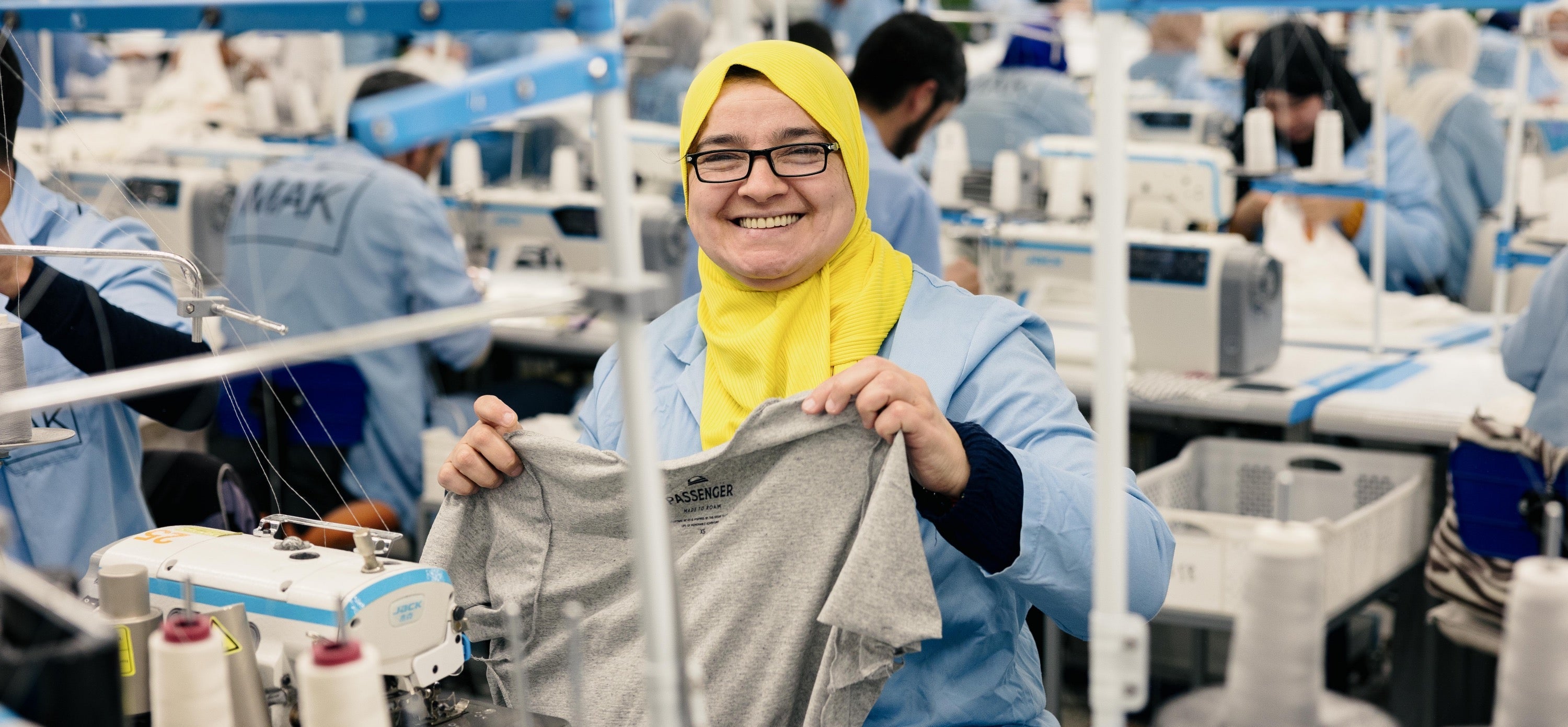Part of our commitment to being as responsible as we can means partnering with the people and suppliers that share our values and stand for quality recycled clothing. We're all about leaving the smallest footprint possible and maintaining high ethical standards.
All our Tees, Hoods and Sweats are made in Morocco in an innovative ‘vertical’ factory. This means the majority of the recycled clothing manufacturing process is done on a singular site which keeps the footprint low and quality controls high.
Transparency and authenticity are core values at Passenger. Earlier this year, Passengers Rich, Sam and Katie hit the road to Tangier, Morocco for mint tea and to catch up with the teams that make it happen.
Ready for an insider look? Let’s go…


Stage 1: Let’s Recycle
All of our t-shirts, hoodies and sweatshirts are made in Morocco, and each starts its Passenger journey as cotton waiting to be recycled. This is a mix of off-cut fabric from within the factory (pre-consumer waste) and old garments, towels and fabric gathered and sent there from the US and Europe (post-industrial/consumer waste).
Once garments are sorted and separated, with prints and elastane removed, they all get shredded into small pieces. This shredded material then goes into the recycling room where it’s returned to a fresh, soft, raw cotton. This is now ready to be spun into yarn and used for our recycled cotton fabric.

Organic cotton, which is grown according to strict organic farming standards without the use of pesticides, fertilisers, herbicides and other toxic chemicals, is then added to the recycled cotton mix to create a sweet, 50/50 blend.
Why 50/50? After heaps of real-world testing, we found a 50/50 blend of recycled and organic cotton hits the sweet spot between durability, comfort and the lowest footprint.

Stage 2: From Yarn to Greige
Our cotton blend is now ready to get spun into yarn and knitted into what the industry calls fabric greige - basically meaning it hasn’t been bleached or coloured yet. This is stored in giant fabric rolls ready for cutting and dyeing. Any imperfections are cut out and fed back into the stage 1 recycling process - no waste here.
At the moment, the spinning process is done in Spain and Turkey. However, in 2025, work will begin to build a spinning plant in Tangier to close the loop and make the process fully circular. Nice.


Stage 3: From Greige to Pattern Pieces
Now we have our blank canvas, it’s time to get pattern cutting, creating the building blocks for our signature comfy fits. Once all the garment pieces have been cut, all fabric off-cuts are sent back to the recycling plant (more waste reduction). All paper from the patterns is also collected and recycled to be used again.

Stage 4: Time To Build Garments
This is where the products start to come to life. Pattern pieces ready, they’re placed onto the sewing line, where every person works solely on one aspect of the garment.

Passenger always has the same dedicated lines and people, which as well as being super efficient, means we can get to know the people creating our products personally and they become experts working with Passenger fits and styles.
Head of Women’s Design Katie couldn’t resist giving it a go…



Stage 5: Garment Dyeing
Time to get colourful. We garment-dye the majority of our products at this factory, which means the entire stitched-together tee, hoodie or sweatshirt is dyed as one rather than dyeing the fabric rolls beforehand. This reduces waste and makes it easier to recycle offcuts.
All of the water from the garment dyeing process is purified and put back into the city water system.

Stage 6: Graphics and Artwork Printing
Our dyed garments are now ready for their signature Passenger graphics. We use water-based inks for all of our prints as they aren’t as harmful to the environment.
The garment is first placed on a special printing turnstile before being marked with a dissolvable ink that signposts the position of the graphic. Every colour in a graphic print needs its own printing screen, which is the mesh frame used to pass the ink through.
Each piece is done one at a time to ensure a neat finish, and finally, the ink is dried and ironed.


Final Stage: Recycled Clothing Quality Control
Each garment is spot checked before being folded and packed into FSC certified paper packaging, no single use plastic in sight. This is the last step in the process for our tees, hoodies and sweatshirts being shipped off to our UK warehouse, ready to make the journey to your door and onwards to a life of escapism.



What makes this a progressive factory?
Companies in the textile and fashion industries that use overseas factories to manufacture garments have a responsibility to push boundaries and support progressive employers. Being mindful of and involved in every step of the process is key to ensuring that the factories we partner with share our values.

Our Moroccan factory allows us to do this, and with commitments to upholding superior work standards, using responsible materials and pioneering new innovations, it’s a factory we’re proud to partner with.
Ethical Conduct
All sites and external suppliers are audited annually according to the RSC Code of Conduct which upholds high ethical, responsible, social, and sustainable standards.
Charity Partnerships
This factory partners with Caritas, a social exclusion charity that employs people with disabilities, to handle post-consumer cotton sorting in Spain. For smaller projects, it partners with Fundació Maresme, a foundation that employs and offers opportunities to people with mental disabilities.
Check out some of our fave recycled clothing products made with love using the process above.


Share:
Celebrating Queer Joy with Amelia Le Brun (She/Her)
The Escape Vol. 34